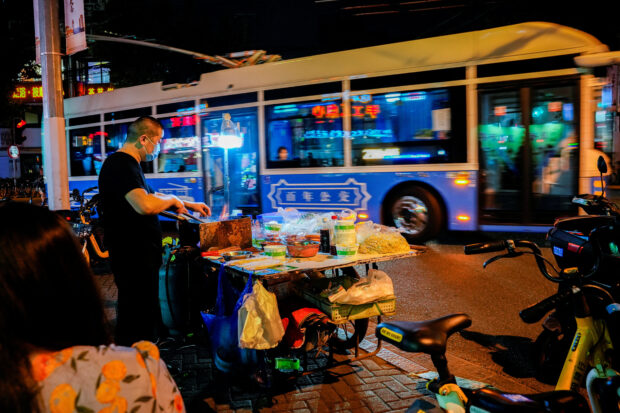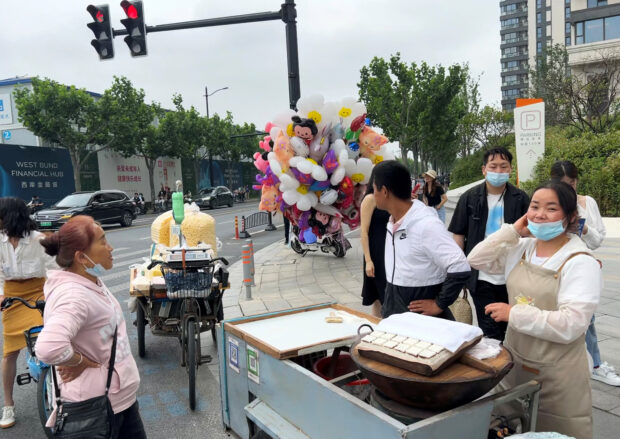
A man cooks noodles on a street in Shanghai, China May 27, 2023. REUTERS/Aly Song/File photo
SHANGHAI/BEIJING – Wang Chunxiang pushes a cart around busy areas of Shanghai, playing cat and mouse with the authorities as she tries to sell pastries. The jobs she could get do not pay enough for her to make ends meet.
“Salaries are too low,” said the 43-year-old, after serving a customer steamed sweet rice cakes from a wok.
“At my age, without much knowledge, I could only earn 5,000 to 6,000 yuan ($868) per month as a cleaning lady. Shanghai rent is so expensive. Even low quality homes are 2,000-3,000 yuan,” said Wang, who recently resumed hawking after a six-year break.
She can earn about 10,000 yuan in a good month selling pastries for 15 yuan a box.
As life in China returns to normal after the pandemic, hawkers are hitting the streets. They look to at least supplement their income amid an uneven economic recovery in which jobs and wage growth has been sluggish.
For decades, street stalls and hawkers – common elsewhere in Asia – have been banned or tightly regulated in many Chinese cities, with authorities seeing them as unsightly.
There are signs, however, that local governments are giving hawkers more leeway, a trend expected to continue.

FILE PHOTO: Wang Chunxiang waits for customers as she sells steamed sweet rice cake on a wheel cart among other street vendors in Shanghai, China May 21, 2023. REUTERS/Nicoco Chan
Zibo in eastern China became a media sensation this month after a rush of tourists visiting street food stalls forced authorities to issue warnings about overcrowding.
The tech hub of Shenzhen, which banned hawking in 1999, will ease restrictions on street stalls from September. Shanghai is seeking public opinion on revising hawker regulations and in April said it had set up 74 spots for vendors.
Lanzhou in the northwest said this month it would designate areas for street stalls as it sought to encourage innovation and entrepreneurship.
“It’s natural for some local governments to trial street vending as they are facing great pressure in stabilizing local economies and the job market,” said Bruce Pang, chief economist at Jones Lang Lasalle.
https://business.inquirer.net/395293/chinas-consumer-inflation-hits-18-month-low-amid-uneven-recovery
Household income grew 3.8 percent year-on-year in the first quarter, lagging broader economic growth. The job market remains sluggish with youth unemployment at a record high.
Economic pressure is forcing hawkers to risk fines or having their products confiscated.
Wang Xuexue, 28, who sells flowers off her scooter in Shanghai, prefers to hawk her goods away from designated areas, which she says are out-of-the-way and charge fees.
“Of course authorities try to catch us. Otherwise we wouldn’t run so fast,” said Wang Xuexue, who worked in a flower shop until recently.
Even in Beijing, which President Xi Jinping said should remain above all a “political centre” without a street economy, hawkers were seen at tourist spots.
Lu Wei, a pen seller, had his own store before the pandemic but cancelled the lease in 2020 as sales dropped and he could no longer afford rent. He now touts his 30-yuan pens along Beijing’s Houhai lake, although business is slow.
“People have no money in their pockets. Even if they do, they don’t want to spend it,” Lu said.
($1 = 6.9121 Chinese yuan)
RELATED STORY:
https://business.inquirer.net/401177/chinas-april-data-show-economic-recovery-losing-steam

